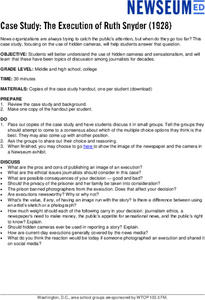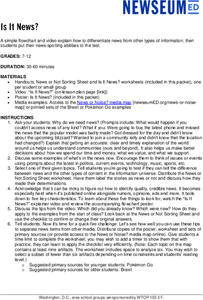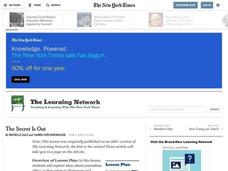Social Media Toolbox
Social Media Messages
What are the elements of a good social media post? The 13th activity in the 16-part Social Media Toolbox incorporates all of the typical components found in a Facebook or Twitter post. Scholars work together to create great posts based...
Curated OER
Using the Commentaries in Class
Students examine language and communication by listening to a commentary radio show. In this communications lesson, students listen to Michael Josephson's radio broadcast using the Internet and analyze his words and their meaning....
Curated OER
Ethical Applications of Human Genetics
Tenth graders read about, observe case study videos, and participate in live interactive broadcasts, and maintain a log book on all of the activities pertaining to the Human Genome Project.
Newseum
Case Study: The Execution of Ruth Snyder (1928)
The case of the 1928 execution of Ruth Snyder takes center stage in a lesson that asks young journalists to consider the ethics involved in publishing an image of an execution. A series of discussion questions ask individuals how they...
Newseum
When Tragedy Hits — Role-Playing a Breaking News Story
Young journalists engage in a role-playing exercise that asks them to consider the journalism and ethical issues raised by the coverage of the mass shootings at Virginia Tech on April 16, 2007. Pupils play the role of either a reporter...
iCivics
Lesson 2: Misinformation
Fake news is a hot topic right now ... but what is it? Intrepid young investigators track down the facts that separate journalistic mistakes and misinformation through reading, research, and discussion. Part three in a five-lesson series...
News Literacy Project
News Goggles: Tracking Developing Stories
A 28-slide presentation introduces viewers to the process reports go through to track and verify developing news stories. Using the reports of the attacks at Atlanta, Georgia, massage parlors as an example, viewers are taught what to...
News Literacy Project
News Goggles: Covering a Newsworthy Trial
The trial of Derek Chauvin, former Minneapolis police officer charged in the death of George Floyd, is the focus of a lesson that asks pupils to compare how local, nationial, and international news organizations reported the testimony of...
News Literacy Project
Fact-Check It!
Here's a lesson designed to help learners develop their digital verification skills. First, expert groups study specific digital verification skills, and in a jigsaw activity, share what they have learned with classmates. The jigsaw...
Newseum
Is It News?
Is it news or not? That is the question young journalists must consider in a lesson about newsworthiness. Class members watch a short video that details five key characteristics of quality, credible news. Individuals then use these tips...
Facebook
Metadata
In previous lessons, young journalists learned about how to trace the original source of scrapes and memes. This interactive lesson plan teaches them another important step in the verification process. Participants learn how to analyze...
DocsTeach
WWI Propaganda and Art
Uncle Sam wants you! During World War II, the US government and military created a propaganda campaign to gain public support. The activity uses primary documents such as photos to explain how and why the propaganda campaign was...
Newseum
Media Mix-Ups Through History: Analyzing Historical Sources
Scholars use the E.S.C.A.P.E. (Evidence Source, Context, Audience, Purpose, Execution) strategy to analyze a historical source to determine why mistakes happen in news stories. They then apply the same strategies to contemporary flawed...
Newseum
Front Page Photographs: Analyzing Editorial Choices
Frontpage photographs are the focus of four activities that ask young journalists to consider what the images reveal about a newspaper and its community. To begin, groups compare what images different papers from across the country use...
News Literacy Project
News Goggles: Newsroom Lingo Review
Learn how to talk like a journalist. Throw around jargon like "lede" and "nut graf." A 20-slide presentation introduces viewers to words and phrases heard in the fast-paced newsroom.
Curated OER
Nothing But the Truth: Anticipation Guide
“What does it mean to be patriotic?” “Should grades factor in to a student’s eligibility for extracurricular activities?” Class members complete an anticipation guide that asks them to respond to a series of statements that highlight...
Facing History and Ourselves
Social Media and Ferguson
How can social media help or hinder civil dialogue? How can information shared on social media be verified? As the investigation of media reports of the events surrounding the shooting of Michael Brown continues, class members read news...
Newseum
Use ‘War of the Worlds’ to Teach Media Literacy
Orson Welles' 1938 radio broadcast of "War of the Worlds" is the focus of a lesson that looks at the importance of clarity in broadcasting. After listening to the radio broadcast, class members discuss the ethical obligations to...
Newseum
When the News Media Make Mistakes
Mistakes happen. When they happen in news reporting, be it in print or on the internet, journalism ethics requires that the errors be corrected. Young journalists use an Accuracy Checklist to track how news organizations post corrections...
Curated OER
Shaping the News
Students explore television journalism. In this journalism lesson, students discuss the attributes of television broadcasting. Students then review their journalism code of ethics and then conduct research for stories that have a moral...
Curated OER
Lessons to be Learned: The Importance of Attribution, Accuracy, and Honesty
Students investigate real world examples of media law issues. In this media law instructional activity, students read Janet Cooke’s feature and respond to the writing. Students read articles by Stephen Glass to highlight facts in need of...
Curated OER
Youth Leading the Way
Students share opinions about groups or activities that give meaning to their lives. They read and discuss the article "Challenging Tradition, Young Jews Worship on Their Terms". Afterward, they investigate and write news articles about...
Curated OER
The Secret is Out
Students explore ideas about journalism ethics as they relate to Watergate and discuss various issues related to an anonymous source being revealed. They write letters to the public editor of The NY Times about credibility and anonymous...
Curated OER
Contraceptives and conscience
Learners read The New Republic article and/or watch the News Ohio streaming video package. They employ a wide range of strategies as they write and use different writing process elements appropriately to communicate with different...

























